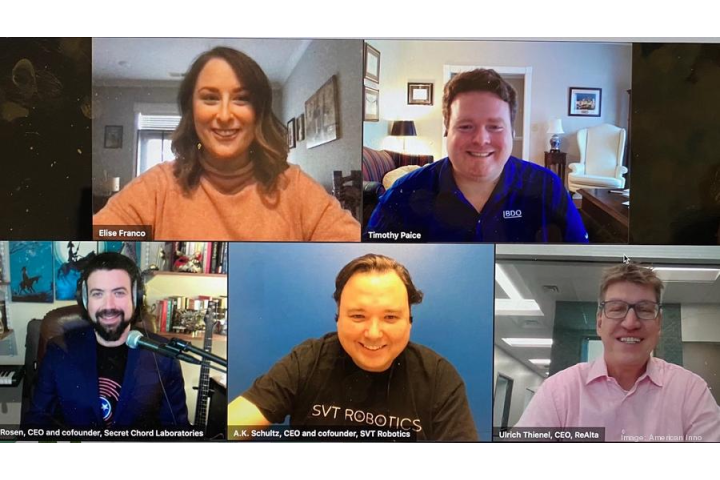From Richmond Inno By Elise Franco

Richmond Inno checked in with Hampton Road founders David Rosen, of Secret Chord Laboratories; A.K. Schultz, of SVT Robotics; and Ulrich Thienel, of ReAlta Life Sciences; during last week’s virtual event Where are They Now? Hampton Roads Startups to Watch
Hampton Roads founders are nothing if not resilient, and they showed us why during Richmond Inno’s Hampton Roads Startups to Watch: Where are they now? event last week.
In March, Richmond Inno published its list of Hampton Roads Startups to Watch in 2020. Nearly one year later, we checked back in with a handful of the founders we were expecting to make big moves.
Wednesday’s event was moderated by Richmond Inno’s Elise Franco and featured Hampton Roads founders Ulrich Thienel, CEO of ReAlta Life Sciences; A.K. Schultz, CEO and co-founder of SVT Robotics; and Dave Rosen, CEO and co-founder of Secret Chord Laboratories.
The event kicked off with a short conversation with Tim Paice, BDO managing tax director. BDO is a Richmond Inno founding sponsor.
Paice offered his expertise on the Paycheck Protection Program and explained what startups and small businesses need to know before, during and after they apply for the loans.
“It’s worthwhile to comment that if you did not receive the funding in that first round, do not fret; there are now additional funds available to you,” he said. “The other thing I want to point out is… the original CARES Act stated the cancelling of debt income would not be taxable income but did not address the underlying deductibility of expenses.”
“You are now able to get the deductions of payroll costs but not having to pick up the income, so that was welcome news,” he added.
Another important thing Paice said small businesses and startups need to remember when applying for PPP loans is to file taxes on time and keep detailed records.
“The [Small Business Association] has stated that potential audits could occur now to six years after loan forgiveness, so there is very much a long tail by which the SBA could look at and audit many of these loans,” he said. “So, just ensuring that you have the appropriate documentation associated with the loan forgiveness of your PPP lending [is important],” he said.
Following the chat with Paice, we talked with Thienel, Schultz and Rosen to find out how they navigated unexpected challenges and doubled down on the wins in 2020. You can watch the full conversation below.
On how 2020 was different from the year or years prior:
Schultz said a better question, considering the unexpected and ongoing presence of Covid-19, is, ‘How wasn’t 2020 different?”
“We, essentially, saw about seven times the growth in our recurring revenue from January to January, and all of that was in Q1 and Q4,” he said. “We owe the lack of sales in Q2 and Q3 to Covid, and now we owe our big uptick in sales to Covid.”
On adapting to challenges and celebrating wins:
Thienel said ReAlta was able to remain successful because of its ability to be agile in its response to crisis. In the midst of the pandemic, the company shifted gears and began studying a different transformative therapy and was able to close on a round of funding.
“We, somewhat serendipitously, had done some work in an animal model of acute lung injury. We said, ‘Look, we can’t sit idly around and just not provide this,’ so we shifted… There was a big risk, but it allowed us to become a clinical-stage company,” Thienel said. “We were also in the middle of a Series A2 raise, and investors stayed with us.”
On what to expect in 2021:
Rosen said Secret Chord Laboratories has its most exciting release yet coming down the pipeline: The launch of Dopr, a predictive, neuroscience-powered AI music platform.
“Basically, we’re going to have a massive corpus of hundreds of thousands of songs from the last five years where you can go in and see how we score those songs based on quality,” he said. “We can look at streaming predictions of that music over different time scales; you can upload your own unreleased music… And we can help you understand which ones to release out into the world first.”






